New faculty orientation
Engineering faculty members share advice, encouragement, and more than a few quotable quips with new faculty at an event hosted by the Center for Faculty Success.
Shortly after having arrived on campus to join the College of Engineering faculty, a group of young professors attended a two-day orientation hosted by the newly relaunched Center for Faculty Success.
Reeja Jayan, faculty director of the center, addressed the new faculty: “As faculty here at Carnegie Mellon, we have a lot of things to do. We do research, we advise students, we teach courses, we create impact, and we change the world through our work as engineers and scientists.”
She added that even though it is exciting and wonderful, it is also challenging, which is why the center was launched to provide support at all stages of a faculty member’s career through programming, experiences, and networking.
During the New Faculty Orientation, attendees were treated to a series of panel discussions with current faculty members who shared words of encouragement and advice on topics designed to cover the broad range of duties they will be expected to carry out as teachers, mentors, researchers, engineers, and collaborators.
Transformative teaching
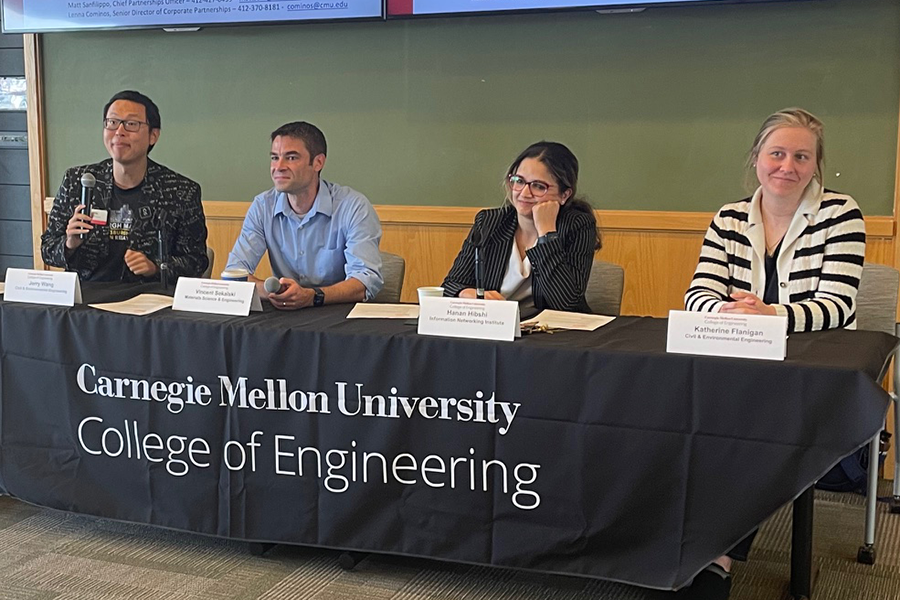
“I bombarded them with requests.”
Hanan Hibshi admitting how much she relied on the Eberly Center for Teaching Excellence & Educational Innovation for support as a new faculty member.
“Students need a happy teacher, not a perfect teacher.”
Jerry Wang on the importance of the attitude professors bring to the classroom.
“They can be demoralizing.”
Vincent Sokalski acknowledged that Faculty Course Evaluation scores can also be really useful in understanding students’ experiences in your classroom.
“Nobody is ever mad about refreshers.”
Katherine Flanigan suggesting that it’s okay to review basic material as a way to manage the different levels of prior knowledge and preparedness students bring to new subject matter.
Engineering impact
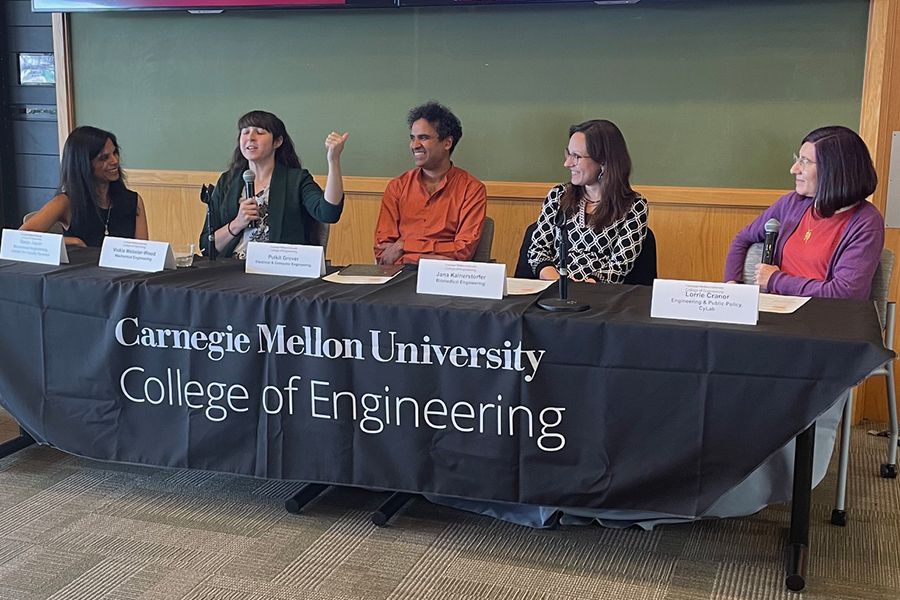
“If you practice luck, it becomes a skill.”
Jana Kainerstorfer shared what at first seemed like strange advice, but that later helped her understand that you make your own luck by going after opportunities and taking the chance to initiate contact or conversation with others.
“You can do anything! But you can’t do everything.”
Vickie Webster-Wood says she wants to do big things, but she knows that she can’t do it alone, so she believes it’s important to be and find valued collaborators when pursuing the big goals.
“You should think of leadership as getting people to do things they didn’t realize they wanted to do.”
Lorrie Cranor says it’s also about getting people to do things they didn’t know they could do and then showing them that, collectively, “we can do it!”
“I’m very motivated by solutions that work for everybody.”
Pulkit Grover encouraged open-mindedness in choosing projects because even small projects and small initiatives can have a big impact.
“Why don’t you do something about this trash!”
A question one of Reeja Jayan’s former students asked about the discarded toxic and dangerous batteries that were sparking massive fires—challenging her to create ways to extend battery life and discover how to bring dead batteries back to life.
How to stay human
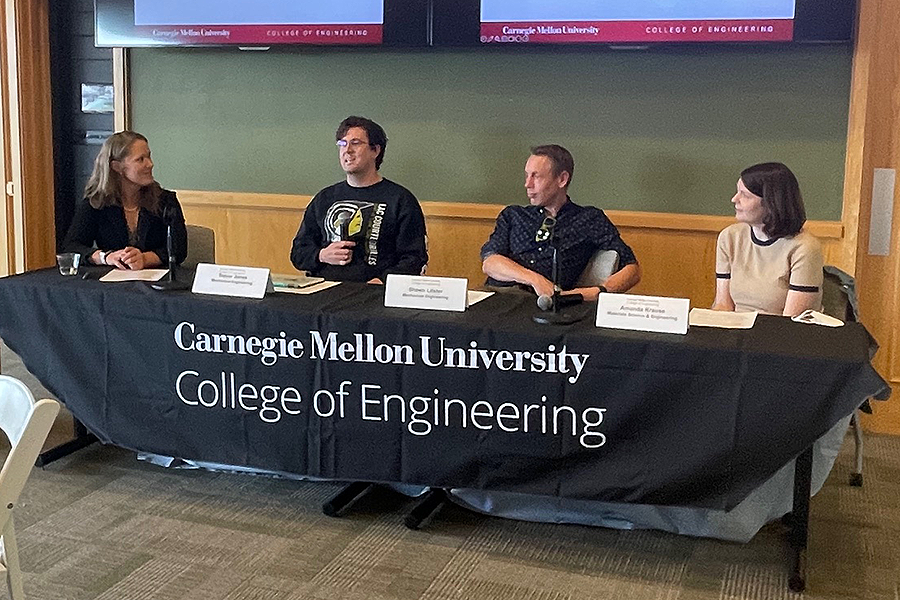
“This job will take as much of you as you’re willing to give.”
Trevor Jones warning new faculty that they have to be intentional in finding the work life balance they need.
“You’re already superstars!”
Shawn Litster warned that their talents and ambitions could either work in their favor by giving them confidence to work hard or against them by driving them to work too hard.
“You wear every character like a hat on your head.”
Amanda Krause quoting Steven Colbert on the value of nurturing all aspects of their identity, which for her means working hard but also allowing herself time for reading, yoga, meditation, and most recently and—more importantly—caring for her infant son
Pioneering research
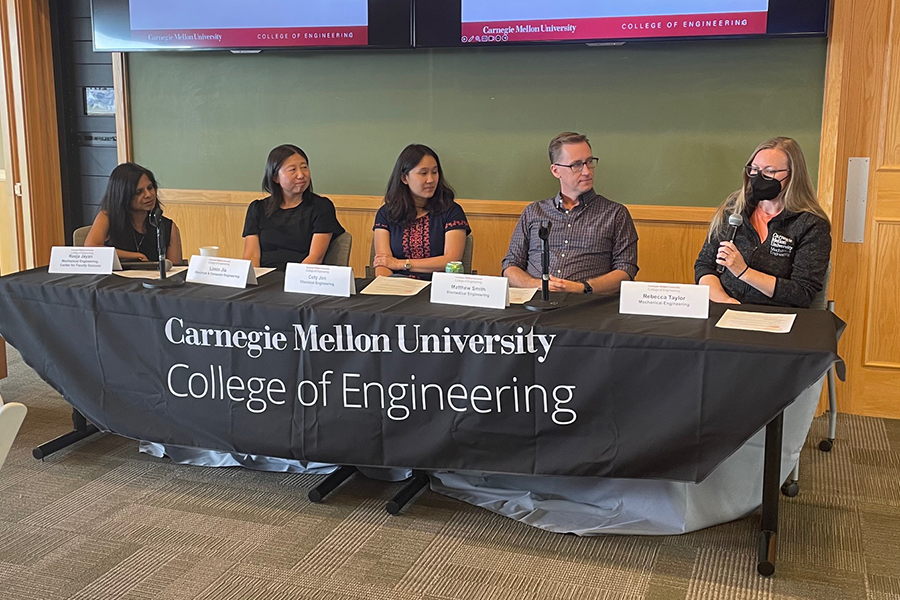
“Oh, I could totally do that better.”
Coty Jen on one way she found research to pursue was learning about methods and approaches used to solve problems that she was confident she could improve upon.
“Research is like a pie-eating contest. It’s all pie, but it’s not all your favorite pie.”
Rebecca Taylor admitting that choosing where to focus your attention is challenging when it is all so appealing, and encouraging new faculty to be thoughtful in choosing.
“Curiosity drives where I want to go.”
Matthew Smith added that his curiosity is tempered by the desire to pursue projects that he believes his skills will add value to, give him the opportunity to work with people he likes, and expand his knowledge so that he will also learn something new.
“You will get more calls than you can handle.”
Limin Jia warning new faculty that it is difficult to say no to invitations to join teams, but if you don’t learn how to choose carefully, you may find yourself getting burned out.
Engineering success for yourself and your advisees
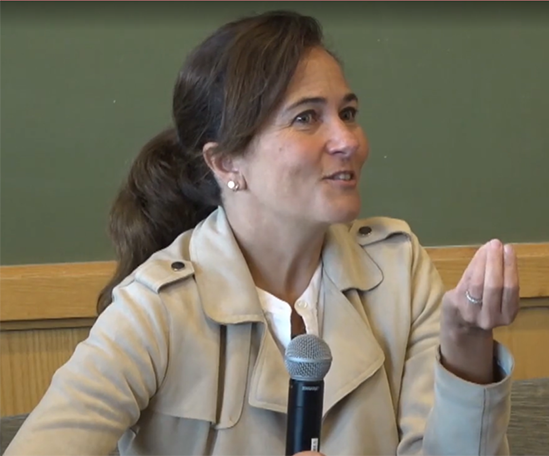
“From day one I tell my students, I am very direct, and I want them to be same with me.”
Burcu Akinci explaining that she brings empathy to her direct communication style, strives to build confidence in her students and when she does need to have a tough conversation, she ends them by sharing a strategy for moving forward.
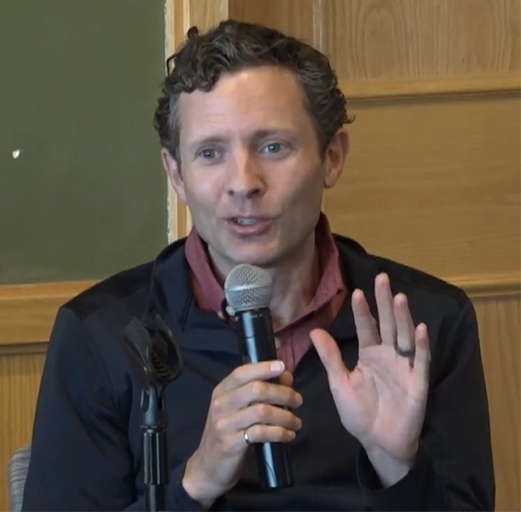
“The students we work with and train are maybe the most important thing we do.”
Alan McGaughey says that he likes to let the leash get longer as he helps his doctoral students grow more independent in their research, acknowledging that it is their Ph.D. not his.
